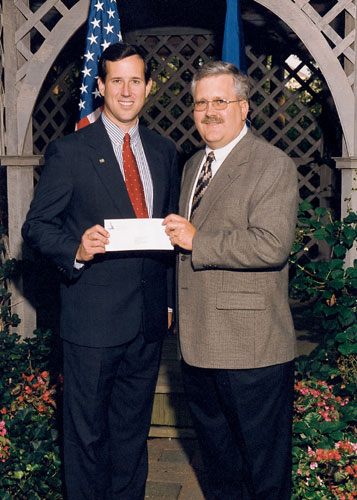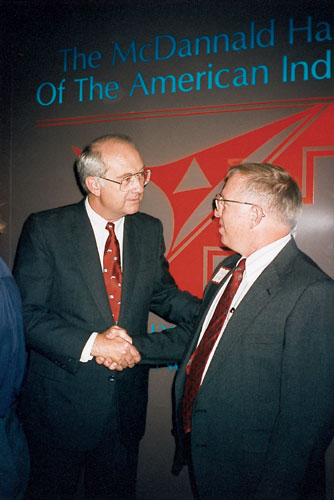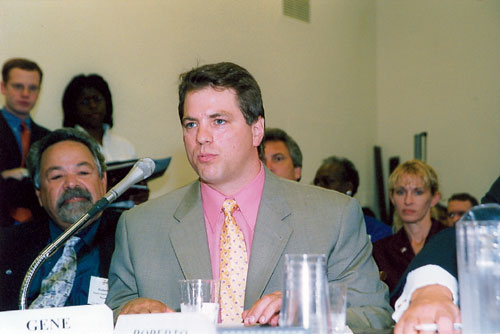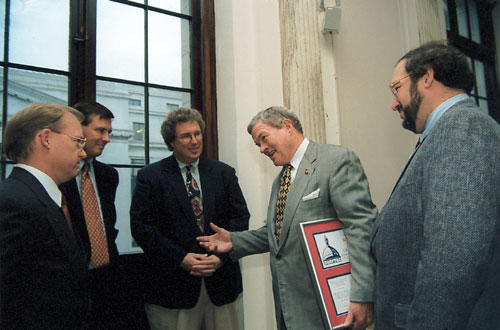When you heard the Blacklisting Rule had been suspended and Superfund reform legislation had been signed, were you aware of NRCA's involvement to make this occur? And did you know NRCA actively lobbies for issues such as immigration and insurance reform, better safety and ergonomics standards, and the repeal of damaging legislation or regulations?
NRCA's Washington, D.C., office is a full-time advocate for NRCA members. NRCA's Washington staff works daily with Congress and federal agencies to advance the roofing industry's agenda while fighting proposals that adversely could affect the industry.
Whether it's fighting to make rules and regulations, such as those for asbestos or fall protection, more reasonable; battling to repeal poorly designed proposals, such as ergonomics or blacklisting; or promoting legislation, such as tax relief or immigration reform, to help small businesses, an active government relations program is crucial to the roofing industry's advancement.
NRCA has compiled a substantial list of legislative and regulatory victories, and key to this success is the association's political action committee (PAC), ROOFPAC.
Without ROOFPAC and NRCA's involvement in Washington, you likely would be working according to even more burdensome rules and regulations and consumers would be paying highly inflated prices for roofing work.
History of ROOFPAC
NRCA's Washington office opened in January 1990, and, several months later, NRCA's board of directors established ROOFPAC. ROOFPAC, a federally registered PAC, is dedicated to supporting pro-business U.S. Senate and House of Representatives candidates.
At the time ROOFPAC was founded, NRCA's board of directors' strategic plan called for ROOFPAC to be an integral part of the association's government relations program and grow in tandem with the Washington office. To accomplish this goal, the board created the PAC Advisory Committee to work with NRCA's Government Relations Oversight Committee.
The PAC Advisory Committee consists of 12 NRCA members from various U.S. regions. The committee is charged with developing programs and events to raise funds, as well as monitoring the selection process by which Senate and House candidates receive contributions. The committee meets twice per year and holds conference calls when necessary to plan events, such as sports tournaments and auctions, that are held during NRCA's annual convention. The Washington office provides the committee with research and information recommending candidates to support, and the committee uses specific criteria to approve contributions (see "ROOFPAC's candidate criteria").
ROOFPAC welcomes NRCA members' input regarding candidate recommendations. Recently, NRCA Director Rick Birkman, president of Texas Roofing Co., Austin, contacted the Washington office to recommend ROOFPAC support John Carter, who ran in the Republican primary run-off election in Texas' new 31st Congressional District on April 9. After careful analysis, ROOFPAC supported Carter, who won with 57 percent of the vote though his opponent outspent Carter's campaign by $1 million. Carter, a district judge, called the Washington office the day after his election to personally express his gratitude for NRCA's support.
Whenever circumstances permit, the Washington office arranges for NRCA members to personally deliver ROOFPAC contributions by attending local fund-raising events for candidates. NRCA Senior Vice President John Gooding, chairman of the board of Gooding, Simpson & Mackes Inc., Ephrata, Pa., contacted the Washington office to encourage support for Sen. Rick Santorum's (R-Pa.) re-election in 2000. Gooding then attended an event in Philadelphia in honor of Santorum and presented him with a ROOFPAC contribution. Santorum now is part of the Senate Republican leadership.

Photo courtesy of NRCA's Washington, D.C., office.
John Gooding (right) chairman of the board of Gooding, Simpson & Mackes Inc., Ephrata, Pa., presents Sen. Rick Santorum (R-Pa.) with a ROOFPAC contribution.
Another 2000 race in which ROOFPAC made a difference took place in Michigan's 8th Congressional District. Freshman candidate Mike Rogers (R) won by 111 votes out of more than 290,000 votes cast and thanked ROOFPAC by stating, "I wouldn't have made it without you."
Proactive strategy
ROOFPAC has supported hundreds of House and Senate candidates since its inception, and about 80 percent of these candidates have won. ROOFPAC is able to achieve such a high winning rate despite the fact that it doesn't necessarily support well-entrenched incumbents.
In fact, ROOFPAC has become a trendsetter among business PACs by providing early support to candidates in highly competitive races. This strategy's result is enhanced visibility in Washington for NRCA.
For example, ROOFPAC was the first national trade association PAC to support Sen. Kay Bailey Hutchison (R-Texas) in her 1993 special-election victory. That year, she spoke to NRCA's board of directors during the association's convention. Now vice chairman of the Senate Republican Conference, Hutchison has made sure NRCA is part of a select group that regularly participates in her high-level policy meetings.

Photo courtesy of NRCA's Washington, D.C., office.
NRCA ensures it is represented at Republican National Conventions. Pictured here is a scene from the 2000 convention.
Another example is ROOFPAC's decision to become involved with the 2000 presidential race. ROOFPAC gave the maximum amount of money allowable by law to President Bush's campaign in 2000; this was the first time it contributed to a presidential candidate. As a result, NRCA now is working closely with the Bush administration. NRCA contractor members and Washington office staff have attended four meetings with Bush at the White House, and the president has sent letters extending his well wishes to attendees at NRCA's past two conventions.

Photo courtesy of NRCA's Washington, D.C., office.
J. Dudley Miles III (right), president of J.D. Miles & Sons Inc., Chesapeake, Va., is talking with Sen. Phil Gramm (R-Texas) at the 1992 convention.
ROOFPAC budget
From a modest $3,200 start in 1990, ROOFPAC now raises and spends more than $200,000 per two-year election cycle. ROOFPAC is registered with the Federal Election Commission (FEC) and raises and spends funds pursuant to the Federal Election Campaign Act. According to the act, a trade association PAC can collect voluntary personal contributions from members to make contributions to federal candidates.
An account called a separate segregated fund is used to collect and spend PAC funds, and disclosure reports must be filed with FEC. ROOFPAC files reports semiannually during nonelection years and monthly during election years.

Photo courtesy of NRCA's Washington, D.C., office.
John Francis, owner and operator of Northern Virginia Roofing Co. Inc., Falls Church, Va., recently spoke before the House Committee on Small Business about his involvement with the NRCA Pentagon Project.
PACs can give up to $5,000 to a candidate per primary and general election—for a total of $10,000. For those states that also have run-off elections, the aggregate total is $15,000. PACs are permitted to raise money through events, such as golf tournaments and auctions, or individual contributions. PACs only can receive up to $5,000 annually per individual.
Reform
Bush recently signed the Bipartisan Campaign Reform Act of 2002, which will change the rules by which organizations finance federal political activity. This law goes into effect Nov. 6 (after 2002 elections) and is aimed at curbing corporate donations, or "soft dollars," which go to national political party committees, such as the Republican and Democratic national committees.
Although the new law will preclude certain types of financial support to other political organizations, it will not change how ROOFPAC's events are sponsored. Ironically, the law will make NRCA's political program even stronger because ROOFPAC only collects personal contributions, or "hard dollars," from individuals to support candidates. Hard dollars are reported to FEC and will be in greater demand once the new law goes into effect.
However, if a company underwrites a ROOFPAC event, such as by sponsoring a golf or tennis tournament, the money will constitute soft-dollar support that will enable ROOFPAC to generate personal donations from those participating in the event. This type of soft-dollar support will continue to be permitted under the new law because such money won't go to a national political party committee and gives NRCA the leverage necessary to raise personal contributions in different ways.
2002 goals
The PAC Advisory Committee's goal for 2002 is to develop programs that will enable ROOFPAC to raise and spend $250,000 for the 2002 election cycle, which ends Nov. 5. With much success at NRCA's 2002 convention in San Antonio, ROOFPAC has raised $170,000 so far.
NRCA's annual convention is the focal point for activities that are crucial to ROOFPAC's fund raising. Convention events include annual golf, tennis, bowling and sporting clay tournaments. ROOFPAC also holds election-year auctions during conventions.
In addition, ROOFPAC has a sustaining-donor program that allows it to budget for elections by counting on annual contributions from NRCA members. Individuals participate by pledging to contribute for a specified number of years.
The benefits
There are many reasons for NRCA to have a PAC. One is to recognize and thank those Senate and House members who have supported the roofing industry. Of equal importance is being a proactive political force to help elect more pro-business, pro-roofing candidates to Congress.
For example, former Congressman James Talent (R) is running for the Senate in Missouri on a platform of affordable, quality health insurance for small businesses through association health plans (AHPs). ROOFPAC supports Talent's campaign, and Talent is grateful for ROOFPAC's help.
"ROOFPAC's support has enabled me to get out my message that we need AHPs now," Talent says.

Photo courtesy of NRCA's Washington, D.C., office.
NRCA representatives present Sen. Christopher S. "Kit" Bond (R-Mo.), the Senate Committee on Small Business' ranking Republican, with ROOFPAC postcards that were mailed to NRCA members in Bond's district reminding them to vote for him. Pictured from left to right: Craig Brightup, NRCA's vice president of government relations; Bill Good, NRCA's executive vice president; Jamie McAdam, president of F.J. Dahill Co. Inc., New Haven, Conn.; Bond; and Steve Kruger, president of L.E. Schwartz & Son Inc., Macon, Ga.
ROOFPAC has enabled NRCA to help elect roofing-friendly candidates to Congress and, in 2000, the White House. But currently, the pro-business majority in the House is thin and Bush does not have a working majority in the Senate. As always, ROOFPAC works to elect the best pro-business candidates regardless of party affiliation.
For more information about ROOFPAC, contact NRCA's Washington office at (800) 338-5765 or visit www.nrca.net.
Patty Roe is NRCA's public affairs manager.
Top 10
NRCA's Washington office—partially through ROOFPAC—fights for legislative and regulatory changes that positively will affect the roofing industry. Here are the top 10 issues NRCA is working on in Washington:
NRCA has helped achieve the following legislative victories:
ROOFPAC's candidate criteria
NRCA leaders review the following criteria before contributing funds to Senate or House of Representatives candidates:
COMMENTS
Be the first to comment. Please log in to leave a comment.